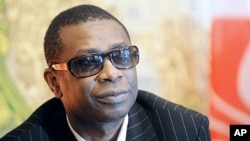Much like in 2011, there will be many elections across sub-Saharan Africa in 2012, including presidential polls now scheduled in Ghana, Senegal, Kenya, Mali, Madagascar, Sierra Leone and possibly Zimbabwe. Oil-rich Angola is working on setting up legislative elections, with the leader of the winning party becoming president. Some analysts say they believe these elections often reap few rewards for voters.
The Democratic Republic of Congo’s Supreme Court recently confirmed results in the last of many presidential elections in sub-Saharan Africa in 2011. The high court rejected opposition complaints of widespread fraud, and confirmed the victory of incumbent President Joseph Kabila.
Kabila has been in power since taking over after his father’s assassination in 2001, promising to modernize and rebuild the mineral-rich country after years of corruption and conflict.
But development experts, human rights activists and corruption watchdogs believe little is changing in the DRC, even though Kabila has had an elected mandate since 2006.
Leonard Wantchekon is the founding director of the Benin-based Institute for Empirical Research in Political Economy.
“Elections in itself are great, having several political alternatives to choose from, different parties to choose from, that is great,” he said.
But he says there are concerns across Africa that democratic progress is not leading to enough social change.
“The disappointment is that it is not clear whether holding more elections improves education outcome, health outcome, whether the countries are better governed and whether there is less corruption, actually, now there is more corruption than there used to be,” Wantchekon stated.
Other presidential elections in 2011 took place in Benin, Cameroon, Cape Verde, the Central African Republic, Chad, Djibouti, the Gambia, Liberia, Niger, Nigeria, Sao Tome and Principe, the Seychelles, Uganda and Zambia. Also, a 2010 presidential poll in Ivory Coast finally came to a bloody resolution last year after months of unrest.
Gnaka Lagoke, who runs the widely read African Diplomacy website, is another analyst who is both hopeful but also concerned with all these elections. “It is good to see that even though there are wars and people are fighting over elections, at least it is good to notice it is vibrant and the African masses are practicing freedom. But we still see the West is doing everything possible to control those elections,” he said.
Lagoke alleges that Western governments and non-governmental organizations apply different types of pressure to get what he calls the good for business-as-usual candidate elected or re-elected, such as Liberian President Ellen Johnson Sirleaf, who won a new mandate last year.
“They have several methods. In the case of Liberia, for instance, when they give a Nobel Peace Prize to a candidate [2011 re-elected President Sirleaf], a sitting president, it boosts the popularity in the country, that is one way," said Lagoke. "The second thing we can say is that all of those observers who go to Africa, the non-governmental organizations, all of them, they will say in chorus the elections were fair because the West has decided a particular candidate they favor is supposed to be the leader."
Lagoke says that what he calls the business-as-usual leaders retain military and economic arrangements suitable to Western interests and existing African political elites. He says even when Western powers and donor nations criticize an election, they do nothing to change the situation, beyond a promise to push for progress in future elections.
Western embassies repeatedly deny interfering in African elections. Election winners in Africa often respond that those who complain about elections are being sore losers, looking for any excuse to justify a defeat at the polls.
These debates, accusations and even violent clashes between political camps are very likely in 2012, with high-stakes elections being held across the continent.
An early contest will be next month, with popular singer Youssou N'Dour now joining many other opposition candidates trying to defeat the incumbent octogenarian leader Abdoulaye Wade in Senegal's February 26 presidential poll.




